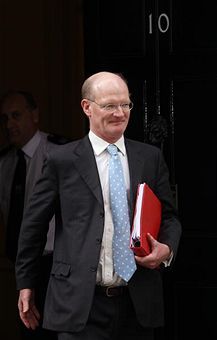 Coffee House has already touched on David Willetts’ interview with the Times (£), highlighting his view that the 50p tax rate is important to prove that “we’re all in this
together”. Willetts does not limit his words to the top rate of tax. In addition to his universities brief, he discusses equal pay issues, social reform and the recent riots.
Coffee House has already touched on David Willetts’ interview with the Times (£), highlighting his view that the 50p tax rate is important to prove that “we’re all in this
together”. Willetts does not limit his words to the top rate of tax. In addition to his universities brief, he discusses equal pay issues, social reform and the recent riots.
Willetts confesses to being a “muser”, never happier than when applying his renowned brain to the broad sweep of government policy. “I wouldn’t be able to function properly as a politician unless I was able to range across some of these wider issues. It just wouldn’t be worth it,” he says.
The muser is loathed in humid student unions as the elitist who will deny a generation a higher education. Willetts denies the charge, asking that his plan be judged in 2015. He is confident that proposals like shortening degree courses to limit costs will open access to the underprivileged, and he is keen to stress that the fees system is fair:
‘Nobody pays up front, they will only start repaying when they earn over £21,000 and we’ve actually got — for the majority of students — an increase in their maintenance support, through grants and loans…It’s a jolly sight fairer than the current system, where you start paying it back [once you have an income of] £15,000 and it’s also certainly fairer than saying people in Liverpool living around Edge Hill University who never went to university have to pay higher VAT or higher income tax.’
Willetts is the original British compassionate Conservative in many ways, so it’s unsurprising that he believes in the political capital of fairness. This appears to inform his view on the 50p rate – that it is, predominantly, a presentational device. But fairness has also inspired his plan, hatched with Vince Cable, to encourage businesses to publish the salary of their chief executive and compare it to that of an average worker.
In a more serious point related to fairness in society, Willetts is convinced that the recent explosion of acquisitive crime and anti-social behaviour revealed the need to address “our deep-seated social and economic problems”. He says, “There is a wider social and economic policy context [to the riots] and we shouldn’t be embarrassed about saying that.” Willetts is clear that criminality should be punished, but stresses that there must be “space for understanding what has gone wrong and what we do to set it right.”
Willetts wrote of some of these issues in his recent book, The Pinch, which posited that the Baby Boomers have devoured resources to the detriment of the next generation. Matthew Parris reviewed the book for the Spectator when it was published last year. Willetts tells the Times that he’s thinking of re-writing the book.






Comments